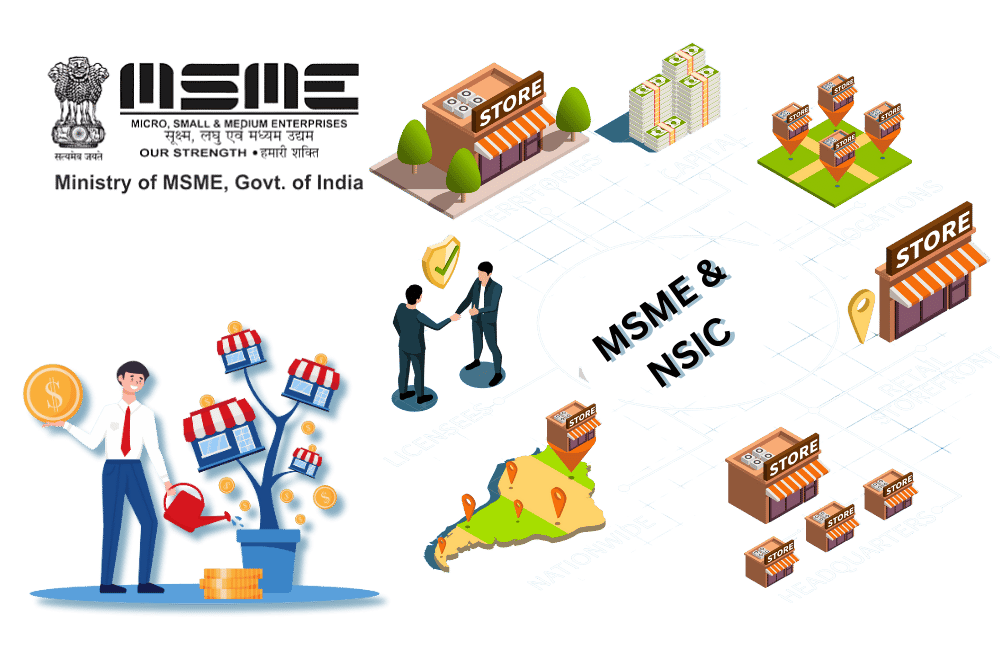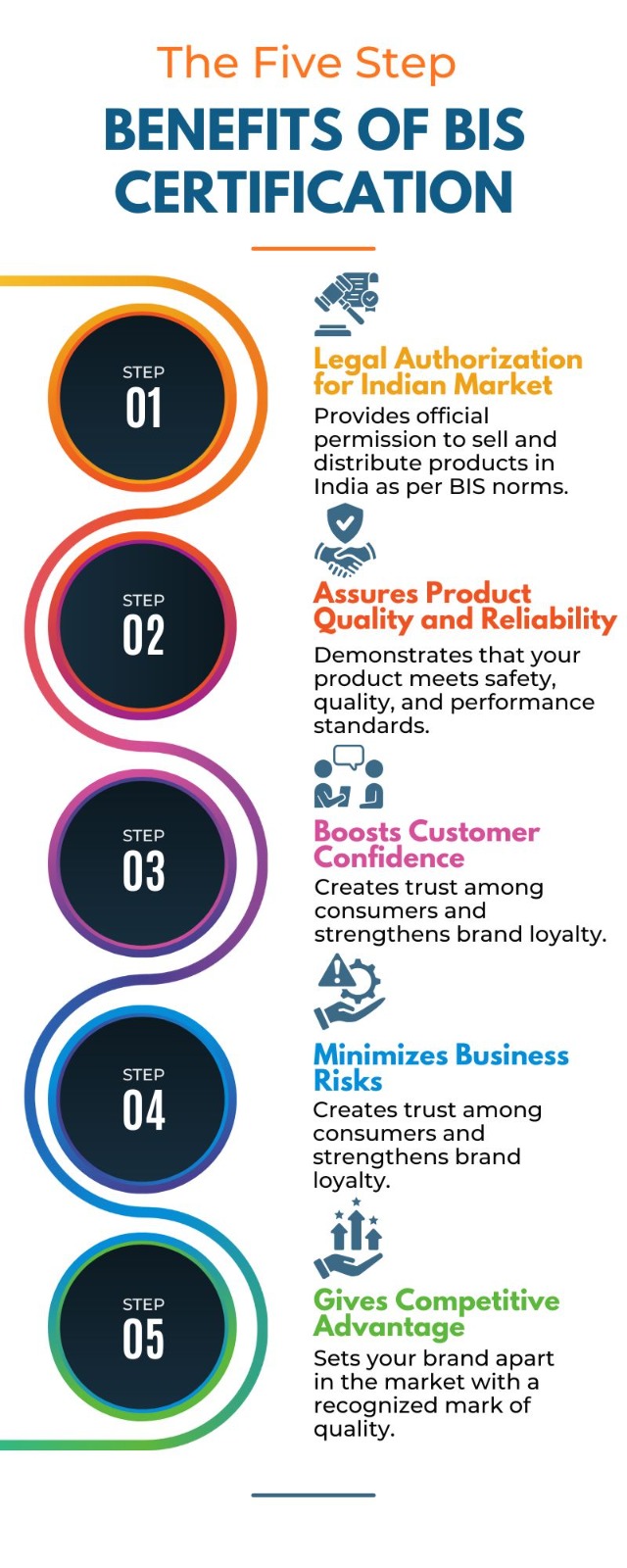Get A Quote
MSME & NSIC Registration - Eligibility, Benefits, Process
MSME and NSIC registrations offer essential support for SMEs, enhancing their economic impact and advancing India’s growth. EVTL India delivers comprehensive consultation solutions for MSME and NSIC registrations, providing 24/7 assistance to ensure seamless registration and maximize benefits for small and medium enterprises.

- Overview
- What is MSME Registration?
- Eligibility Criteria for MSME Registration
- Benefits of MSME Registration
- What is NSIC Registration?
- Eligibility Criteria for NSIC Registration
- Benefits of NSIC Registration
- Comparing MSME and NSIC Registration
- How to Register for MSME
- How to Register for NSIC
- Key Differences Between MSME and NSIC
- Conclusion
- Frequently Asked Question (FAQ)
MSME & NSIC Registration - Overview
Micro, Small, and Medium Enterprises (MSMEs) form the foundation of India’s economic development, significantly contributing to the nation’s GDP, exports, and employment. MSME registration was established to promote growth for small and medium-sized businesses by providing access to resources, financial support, and government-backed schemes.

In tandem, the National Small Industries Corporation (NSIC) registration is aimed at further supporting these businesses, particularly in areas of marketing, finance, and technology upgrades. This guide outlines the essential aspects of MSME and NSIC registration, including eligibility, benefits, and differences between the two.
What is MSME Registration?
MSME registration is a government initiative that enables businesses to avail of various benefits aimed at promoting growth. The main goal of this registration is to offer a supportive environment for small and medium enterprises, which collectively contribute around 45% of India’s manufacturing output, 40% of exports, and over 8% of the national GDP. Established under the Micro, Small, and Medium Enterprises Development (MSMED) Act, 2006, MSMEs receive a conducive structure for operations, resources, and overall development.
Eligibility Criteria for MSME Registration
To register as an MSME, businesses must meet specific criteria:
- Ownership Structure: Must be a proprietorship, partnership, private limited company, or limited company.
- Investment and Turnover: Categorized based on investment in plant and machinery/equipment:
- Micro: Investment up to ₹1 crore; turnover up to ₹5 crore.
- Small: Investment up to ₹10 crore; turnover up to ₹50 crore.
- Medium: Investment up to ₹50 crore; turnover up to ₹250 crore.
- Business Type: Must be engaged in manufacturing, production, processing, or service activities.
Benefits of MSME Registration
MSME registration offers various advantages that help businesses grow and become more competitive:
- Access to Finance: Easier access to loans and credit facilities from banks and financial institutions at subsidized interest rates.
- Priority Lending: Banks prioritize lending to MSMEs, ensuring quicker approvals.
- Government Subsidies: Businesses can access subsidies and rebates, such as tax and energy-saving incentives.
- Protection under MSMED Act: Ensures prompt payments and legal protection for timely dispute resolution.
- Ease of Government Approvals: MSMEs enjoy simplified regulatory approvals, making business processes smoother.
What is NSIC Registration?
The National Small Industries Corporation (NSIC), established in 1955 under the Ministry of MSME, provides further support to small businesses. NSIC registration is optional and focuses on assisting SMEs in areas of marketing, technology upgradation, credit access, and export promotion. NSIC enables SMEs to participate in government tenders and procurements and facilitates growth through skill development programs and technical support.
Eligibility Criteria for NSIC Registration
To be eligible for NSIC registration, businesses must meet the following conditions:
- MSME Registered: The business must have a valid MSME registration.
- Legal Structure: The entity must be a proprietorship, partnership, private limited company, or limited company.
- GST and PAN Compliance: GST registration and PAN card are mandatory.
- Industry Compliance: The business should operate in manufacturing or service sectors and maintain a clean operational record.
- Investment Compliance: The investment in machinery and equipment should comply with the current NSIC criteria for small and medium enterprises.
Benefits of NSIC Registration
NSIC registration offers unique advantages, especially in enhancing a business’s market reach and technological capacity:
- Marketing Support: NSIC promotes SMEs’ products in both domestic and international markets through fairs, exhibitions, and buyer-seller meetings.
- Technology Upgradation: Helps SMEs upgrade equipment and technology to stay competitive.
- Financial Assistance: Offers financial aid such as raw material procurement and working capital.
- Tender Participation: Facilitates SMEs’ participation in government tenders, including exemptions from certain requirements.
- Export Promotion: NSIC actively promotes SMEs in trade events to enhance exports.
- Skill Development: Provides training programs to improve the skills and knowledge of the SME workforce.
Comparing MSME and NSIC Registration
While both MSME and NSIC registration aim to promote the growth of small and medium businesses, they have different scopes, benefits, and eligibility requirements. Here’s a side-by-side comparison of the two:
| Aspect | MSME Registration | NSIC Registration |
|---|---|---|
| Purpose | Government-recognized status providing tax benefits, credit, and subsidies | Assists SMEs in marketing, technology, and financial support |
| Eligibility | Investment-based (e.g., ₹50 crore for medium enterprises) | Requires MSME registration, PAN, GST, and industry compliance |
| Key Benefits | Credit access, priority lending, protection under MSMED Act, subsidies | Tender participation, export promotion, marketing, skill development |
| Validity | Permanent | Typically 2 years (renewable) |
| Registration Fees | Free | Fees range from ₹1,500 to ₹8,000 based on turnover |
| Sector Focus | Open to all industries within defined investment limits | Mainly manufacturing and service sectors |
How to Register for MSME
The MSME registration process is straightforward and can be completed online:
- Visit the Udyam Registration Portal: MSME registration is managed via the Udyam Registration platform.
- Enter Business Details: Provide information on the type of organization, PAN, GST, Aadhaar (of owner or director), and bank details.
- Verification and Submission: After submitting, the details are verified, and a unique MSME registration number is generated.
- Receive Udyam Certificate: The Udyam Certificate is an e-certificate that serves as proof of registration and is used to claim benefits under MSME schemes.
How to Register for NSIC
NSIC registration is more involved, requiring adherence to additional criteria. Here’s a step-by-step process:
- Submit Application Form: Obtain the NSIC application form online or from an NSIC office.
- Provide Required Documentation: Necessary documents include MSME registration certificate, financial statements, and proof of good financial standing.
- Verification Process: NSIC representatives verify the documents and assess the business for eligibility.
- Payment of Fees: Pay the registration fees based on turnover.
- Issuance of Certificate: Upon successful verification, NSIC issues a registration certificate valid for two years.
Key Differences Between MSME and NSIC
- Scope: MSME registration is essential for obtaining government-backed benefits and financial support. NSIC is specifically useful for businesses seeking access to tenders, marketing support, and technology advancements.
- Financial Aid: MSMEs enjoy benefits such as loans and subsidies, while NSIC provides specialized financial assistance for working capital and raw material.
- Marketing and Export: NSIC directly aids SMEs in reaching broader markets and participating in exports, unlike MSME registration, which focuses more on internal development and operational support.
Conclusion:
MSME and NSIC registrations each offer distinct benefits and avenues of support to small and medium enterprises. MSME registration serves as a foundational recognition, offering financial support and legal protections that enable SMEs to operate and grow with ease. NSIC registration, on the other hand, supports market expansion, technology upgradation, and export promotion, making it invaluable for businesses ready to scale or compete globally. Together, these registrations create a holistic support system for SMEs, helping them strengthen their economic presence and contribute to India's socioeconomic progress.
Frequently Asked Questions (FAQ)
Our Services
News & Updates









